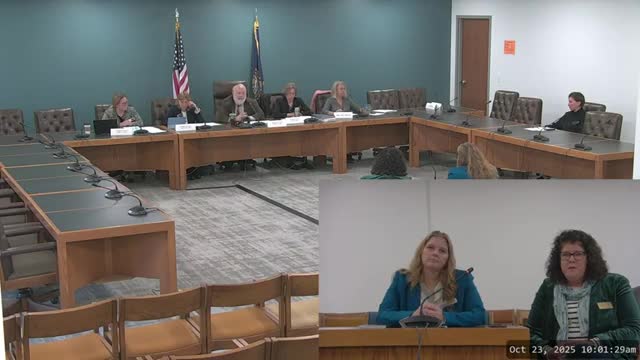NH SAU study committee debates separating academic and business functions; legal and cost questions raised
Get AI-powered insights, summaries, and transcripts
Subscribe
Summary
Committee members debated whether to split academic oversight (local school boards/principals) from business functions (larger consolidated SAUs), with members raising concerns about local control, capacity of principals, labor contracts, and possible constitutional issues if consolidation affects existing contracts.
The Committee to Study Reducing the Number of School Administrative Units in the State spent substantial time debating proposals to separate academic functions from business operations and to consolidate SAUs.
Chair discussion papers and a proposal from an outside analyst prompted a range of views. The chair framed a possible model that would shift “business” tasks—payroll, purchasing, accounting, benefits and other administrative services—to larger consolidated SAU entities while moving academic leadership and classroom oversight closer to school boards and principals. The chair noted the proposal used the term “chief education administrator” for a business-focused role separate from an academic superintendent.
Several members questioned whether principals and local school boards have the capacity to assume supervisory and curriculum responsibilities currently held by superintendents. Representative Berkey said school boards and lay members do not necessarily have the expertise to “develop, review and evaluate curriculum.” Representative Dreier and others warned consolidation must preserve local voice: smaller communities leave larger arrangements when they feel under‑represented.
Representative Damon cautioned that business managers must understand education to make sound operational decisions and that shifting duties without altering or funding capacities could simply move costs rather than save money. Members debated labor relations and contracting: the committee heard informal legal guidance that “the scenario you presented may raise constitutional issues under both state and federal contract clauses,” and that whether legislation could void or impair existing superintendent or district contracts would be fact‑specific and could require phased implementation.
Committee members discussed practical implementation questions including: how collective-bargaining agreements and benefit packages would be handled in larger consolidated SAUs; whether hiring and evaluation routines would be standardized across multiple local districts; how grievances and arbitration would be escalated; and the potential for litigation or contract-repurchase costs if consolidation were implemented too rapidly.
No final policy decision was taken at the meeting. The committee approved the minutes of its Oct. 15 meeting at the start of the session (motion to approve minutes moved by Representative Leon and seconded by Representative Berkey; Representative Lam recorded an abstention). The committee asked staff and presenters to provide additional data and said it would schedule at least one follow-up meeting to continue drafting the final report.
Why it matters: Consolidation or reorganization could affect superintendent and SAU staffing, labor contracts, local budgets and the delivery of services such as special education and transportation. Committee members repeatedly emphasized that any statutory change would need clear implementation timelines and attention to contract and funding consequences.
Next steps: The committee requested more information on comparative models (including lessons from nearby states), sample contract provisions and precise fiscal numbers so members could analyze potential savings, costs and legal risks before recommending statutory changes or a reporting deadline extension.
